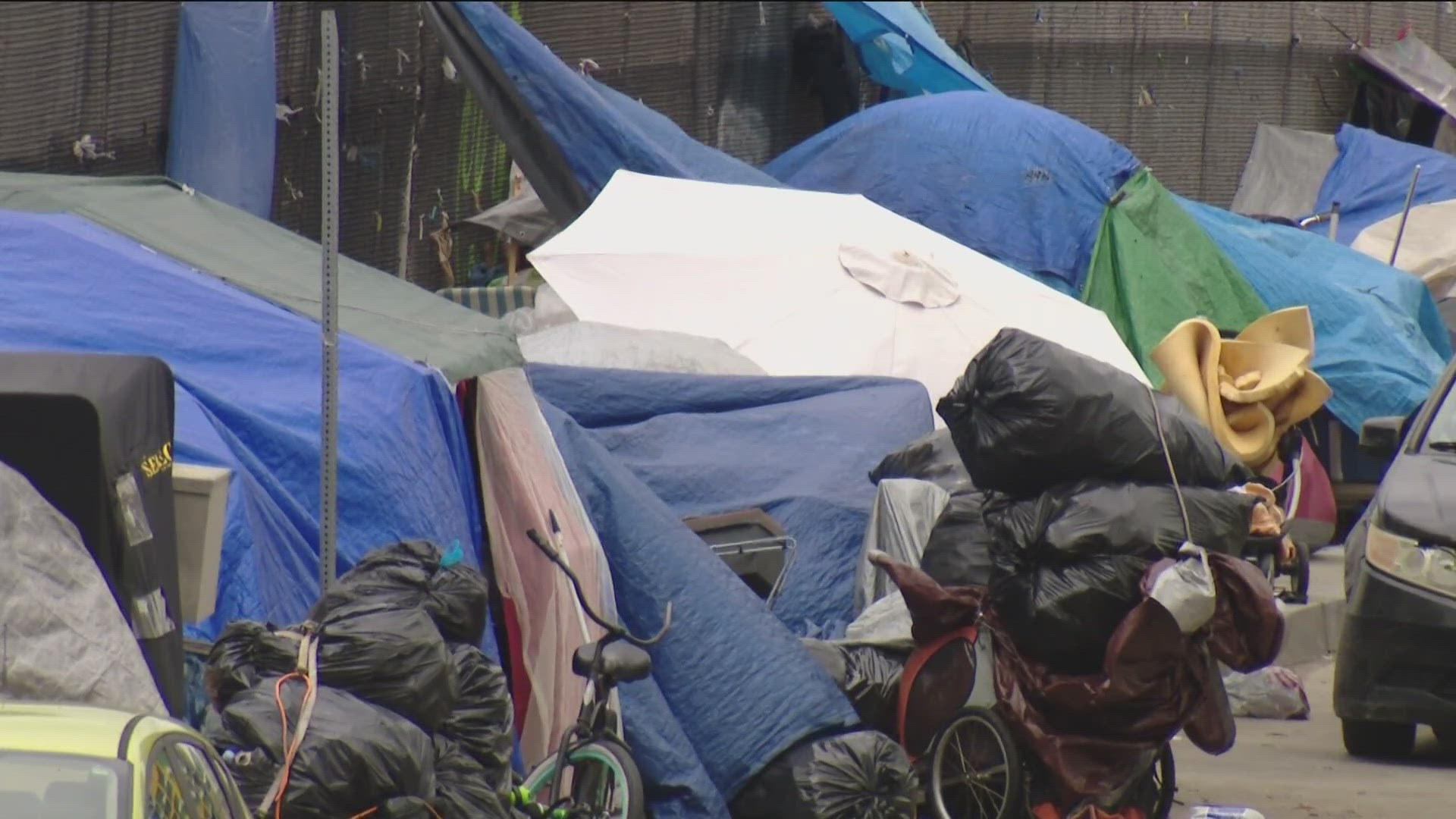SAN DIEGO — An annual summit to find solutions for the homelessness crisis was held on the UC San Diego campus Thursday, the same day Governor Gavin Newsom issued an Executive Order, directing state agencies to clear homeless encampments from state owned public spaces.
"I think housing is a human right, but there’s a corresponding obligation to use it," said State Senator Catherine Blakespear.
She hosted the summit for a second year, which included different panels on addressing the crisis.
"People should not be able to live in public spaces or wherever they want. We’ve gotten to the point where we’re tolerating it and it’s become normalized," she added.
Mayor Todd Gloria took part in the summit. He told CBS 8 the governor's order aligns with what's already happening in San Diego under the city's encampment ban.
"We all understand encampments are unsafe and unhealthy, you do have to give people a place to go," said Mayor Gloria. "I’m hopeful his announcement today is really a directive to smaller cities, not big cities up and down the state who I think are working in good faith to expand shelter capacity, but really those small and midsize cities in our county that do none of this work."
Meanwhile, State Senator Blakespear said state and local governments need to do a better job of tracking where money is going to address this crisis.
“We need to have much more accountability around the programs we are funding. The goal should be to have people exiting homelessness to housing. It's not just that people are served or received a flyer, or they were connected to snacks, that is not solving homelessness," she said.
Deacon Jim Vargas, president and CEO at Father Joe's Villages, commented on the order.
"People — no matter their circumstances — have the right to safe and adequate shelter. But thousands of individuals and families across California have few options when they come to lay their head down for the night," he said. "As one of the largest homeless services providers in Southern California, we know that jail is not a solution to this growing crisis. It is critical that any efforts to remove encampments are coupled with efforts to increase the availability and diversity of shelters in our cities and regions, including shelter options that focus specifically on unique needs, such as addressing substance use."
"Along with shelter, we must also prioritize increasing the supply of affordable housing and the ability to access comprehensive services that help people achieve and maintain self-sufficiency," Vargas wrote in a statement. "Homelessness is a crisis we can solve in our communities, but the solutions must be grounded in our shared humanity. We must meet this moment with both compassion and action for our neighbors in need."
In an interview with CBS 8, Deacon Vargas said, "It's one thing to say that encampments are not allowed and are outlawed. It is another thing to realize, okay, where are these individuals going to go?"
"The order in the absence of concrete ways of making changes in my mind is not helpful, and is not productive," he added.
Deacon Vargas sees this as a call to action for the community, but in the face of a lack of shelter beds and other critical services, he says the order itself is not realistic.
While the Governor's order calls on state officials and local leaders to act "with urgency," it also cautions them to remove these camps "humanely."
Deacon Vargas underscored the need for humanity in this.
"We like to say we are a world-class city and I believe that we are," he told CBS 8. "But the reason we prove that, primarily and especially is by showing that we take care of the most vulnerable here within our community."
WATCH RELATED: Deacon Jim Vargas of Father Joe's Villages reacts to Governor's executive order on encampments
The Supreme Court's 6-3 decision on June 28 reversed a ruling by a San Francisco appeals court that found outdoor sleeping bans amount to cruel and unusual punishment when there is no available shelter space for the homeless. The ruling of the Supreme Court's majority found the 8th Amendment does not apply to outdoor sleeping bans.
The case originated in the rural Oregon town of Grants Pass, which appealed a ruling striking down local ordinances that fined people $295 for sleeping outside after tents began crowding public parks. The U.S. 9th Circuit Court of Appeals, which has jurisdiction over nine Western states, ruled in 2018 that such bans violate the 8th Amendment of those who are in areas where there are not enough shelter beds.
The three liberal justices, Sonia Sotomayor, Elena Kagan and Ketanji Brown Jackson, dissented.
"It is possible to acknowledge and balance the issues facing local governments, the humanity and dignity of homeless people, and our constitutional principles," Sotomayor wrote in her dissent. "Instead, the majority focuses almost exclusively on the needs of local governments and leaves the most vulnerable in our society with an impossible choice: Either stay awake or be arrested."
San Diego, Santee and other municipalities around the county have passed similar ordinances to the one in Oregon.
Justice Neil M. Gorsuch wrote for the majority opinion.
"Homelessness is complex," Gorsuch wrote. "Its causes are many. So may be the public policy responses required to address it. At bottom, the question this case presents is whether the Eighth Amendment grants federal judges primary responsibility for assessing those causes and devising those responses. It does not."
Watch Related: Homeless encampment cleared in South Bay after neighbors complain (Jul 23, 2024)

